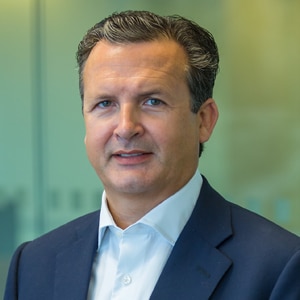Transforming Business: Celebrating Social Impact
06 SEP 2017 – Goldman Sachs brings together over 150 alumni of our 10,000 Small Businesses (10KSB) UK programme at the Serpentine Galleries for an evening discussion on “Transforming Business” moderated by Dermot Mcdonogh, Chief Operating Officer, Chief Financial Officer and Head of the Federation for EMEA, Goldman Sachs. During the evening we'll look at the extraordinary work of our social entrepreneurs and social enterprise. Below is an article by Dermot which addresses the themes expected to be discussed at the event.
Transforming Business
By Dermot Mcdonogh
Chief Operating Officer, Chief Financial Officer and Head of the Federation for EMEA, Goldman Sachs
There are over 70,000 social enterprises in the UK, and they are contributing over £24 billion to the UK economy. Both nationally, and in our 10KSB peer group, social enterprise are growing faster than non-social enterprises. They are disruptive, highly innovative, and an ever increasing presence in the UK.
Over 10% of 10KSB UK participants run social enterprises and they collectively employ over 2,500 people with a combined turnover of £112 million. These social enterprises reinvest their profits back into their business or the local community, allowing them to tackle some of the world’s most pressing societal issues.
The inclusion of social enterprises is a critical part of the core 10KSB UK programme. These entrepreneurs bring a dynamic perspective to the classroom and help to challenge their peers to consider social impact as part of their business strategies.
For large corporates and for small businesses alike, we face a challenge to continuously innovate how we engage with the communities in which we live and work.
One way we do this at Goldman Sachs is through our core philanthropic programmes: 10,000 Women, 10,000 Small Businesses, Community TeamWorks, and Goldman Sachs Gives as well as through supporting special projects, such as the annual support of the Serpentine Pavilion.
In addition to these external activities, we also consider our social and environmental impact across a variety of firmwide activities and we have applied this thinking across the entire scope of the firm’s new London headquarters, which will be completed in 2019.
Before engaging in this project we committed to providing not only an excellent office to support our people – but also that the firm’s large investment in the new campus would work in harmony with our local community.
Throughout demolition and construction, the project has focused on making a positive contribution through providing employment opportunities to apprentices, setting procurement targets with SMEs, local businesses and minority owned businesses, hosting educational visits with local school and college students, and reducing environmental impacts, including 99% of waste from landfill.
As businesses, being socially responsible is no longer a “nice to have”; it is a “need to have”. When we take decisions, we should be asking ourselves – is there a way to improve our businesses and also make an impact more broadly? If yes, then that is the route we should choose. These changes take time – and we know we still have more to do – but it’s the right long-term strategy for both our businesses and our communities.


